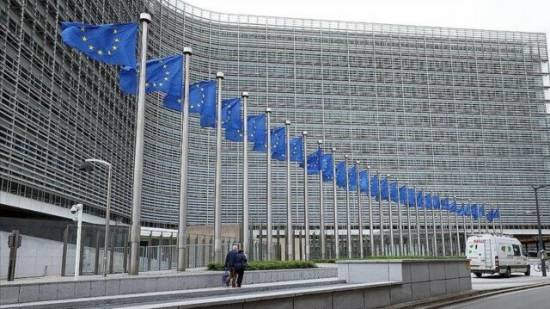Bloc’s border agency comes to fore when Greek coast guard pushed backed migrant boats in Aegean Sea, many lost their lives
The European Border and Coast Guard Agency, also known as Frontex, has been in the middle of pushback scandals in the Aegean Sea in recent years, with the resignation of its head making the headlines most recently.
Frontex was founded in 2004 with a mission to coordinate the European Union's external borders and it began to operate on Oct. 3, 2005 in a small office. It was established with a budget of €6 million ($6.3 million) and 70 employees.
It was aimed at preventing criminals from entering the Schengen area, thus stopping them from traveling freely between the EU countries without borders.
Due to terror attacks in recent years, more authority has been given to the EU and Frontex to protect politically sensitive external borders for member states.
In the following years, Frontex's border protection teams and response units were established to support EU countries.
- From small office to huge institution worth €543M
In 2015, French national Fabrice Leggeri was appointed head of the EU's border agency, which is headquartered in Warsaw, Poland.
Frontex, which was operating for mostly administrative work when Leggeri took the office, eventually turned into an armed and uniformed border guard organization with a budget of €543 million.
It has become one of the EU's biggest organizations and institutions with the largest budget, aircraft, boats, and more than 1,500 employees.
Comprising 26 countries, the Schengen area extends along some 44,000 kilometers (27,30) miles) of external sea borders and almost 9,000 km (5,600 mi) of land borders.
Frontex's duties include rapid border interventions, joint search and rescue efforts, humanitarian aid, screening and identification of migrants, and the prevention of terrorist activities as well as human and property smuggling.
It helped rescue 13,000 migrants in 2020 and identified 1,200 people and drug traffickers, according to Frontex data.
- Frontex in midst of scandals
Frontex, which was founded with great hopes, has been at the center of major scandals since its establishment.
It came to the fore when the Greek coast guard pushed backed migrant boats in the Aegean Sea and many lost their lives in these incidents.
Reports of pushbacks involving the Greek coast guard and Frontex have surfaced in the international press since 2020.
A joint investigation carried out by France's Le Monde newspaper, German weekly Der Spiegel, Swiss news outlets SRF Rundschau and Republik, and Netherlands-based Lighthouse Reports revealed in late April that Frontex was involved in 22 pushbacks between March 2020 and September 2021.
Germany's public broadcaster ARD and Der Spiegel, French daily Liberation, Serbian newspaper Novosti, Croatian TV network RTL, Netherlands-based investigative journalism group Bellingcat, and Lighthouse Report covered many studies on Greek pushbacks.
Greek coast guard boats were blocking, damaging, or even sinking the boats of migrants who were seeking to cross from Turkiye to Greece, according to the reports.
According to allegations, Frontex, despite knowing the pushbacks that are against international law, tolerated and did not prevent violations of fundamental rights, and in some cases, it helped Greek officials.
It was claimed that thousands of people were victims of pushbacks in which Frontex was involved and some migrants lost their lives.
Following media coverage, Frontex and its management came under criticism in Brussels. Some members of the European Parliament demanded the resignation of Leggeri. The EU Commission also requested an explanation from Frontex.
For the first time in its history, the EU's border agency was the subject of lawsuits. Two migrants who were pushed back in the Aegean Sea appealed to the EU Court of Justice.
- Frontex investigations
The EU's Anti-Fraud Office (OLAF) has launched an investigation against Frontex and Leggeri.
Leggeri and other senior officials not only knew about Greece's pushbacks but also covered them up, according to OLAF reports leaked by media outlets.
The European Parliament also established a special working group on Frontex and started to investigate the allegations. The probe found that Frontex did not prevent violations of fundamental rights.
The media reports were supported by numerous evidence such as witness statements, video recordings, and satellite images. The Frontex database contains records of hundreds of irregular migrants being pushed back in the Aegean.
- Resignation after years
Having been associated with constant scandals in recent years, Frontex and Leggeri have recently made the headlines with the resignation of its chief.
Leggeri submitted his resignation to the Frontex Board of Directors almost two years after the allegations against him emerged.
The European Parliament also did not approve Frontex's budget over its role in pushbacks and management problems. The parliament, which discussed the 2020 budget, has not released Frontex's budget for this period yet.
Frontex's spending was not approved due to ongoing investigations and administrative issues regarding fundamental rights, including the pushbacks. The parliament demanded to see all the investigative reports prepared on these issues and postponed the release decision until autumn.
Frontex and Greek authorities have always denied the allegations of international human rights organizations, the international press, politicians, and many institutions regarding the pushbacks.
Turkiye was also among those who reacted to Greece and Frontex regarding the pushbacks. Turkish officials have often stressed that pushbacks are inhumane.
"This is because some part of the budget was used for pushback of migrants. The Frontex did not only watch this, it also bore witness and participated in these inhumane practices. The withholding of the budget and resignation of the executive director do not acquit the Frontex," Turkish Foreign Minister Mevlut Cavusoglu said on the disapproval of the Frontex budget./aa


